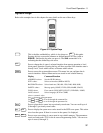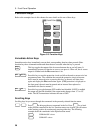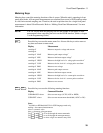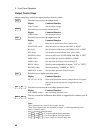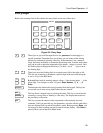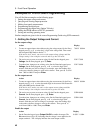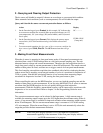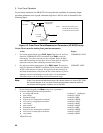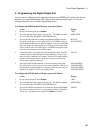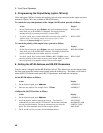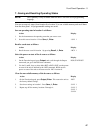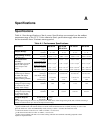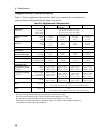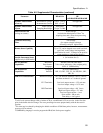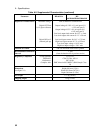Front Panel Operation - 5
45
4 - Programming the Digital Output Port
Your dc source is shipped with the output port function set to RIDFI mode. In this mode the port
functions as a remote inhibit input with a discrete fault indicator output signal. You can also
configure the port to act as a Digital Input/Output device.
To configure the RIDFI mode of the port, proceed as follows:
Action Display
1. On the Function keypad, press Output. *RST
2. Scroll through the Output menu by pressing q . The PORT command
lets you select either the RIDFI or the DIGIO function.
PORT RIDFI
3. Scroll to the RI command to configure the Remote INHibit indicator.
Use the ã and ä keys to select either LIVE or LATCHING, either of
which enable the RI indicator. With RI enabled, a low-true on the INH
input will disable the output of the unit. LIVE causes the output of the
unit to track the state of the INH input. LATCHING latches the output
of the unit off in response to the inhibit signal.
RI LIVE
RI LATCHING
4. Access the Output menu again and scroll through the menu. The DFI
command lets you enable the Discrete Fault Indicator. Use the ä key
and select ON to enable the FLT output. With the FLT output enabled,
the open-collector logic signal can be used to signal external devices
when a fault condition is detected.
DFI ON
5. Scroll to the DFI:SOUR command to select the internal source that
drives this signal. Use the ä key to select from the RQS or ESB bits, or
the Operation or Questionable status registers. Status summary bits are
explained in chapter 3 of the Programming Guide.
DFI:SOUR RQS
DFI:SOUR ESB
DFI:SOUR OPER
DFI:SOUR QUES
To configure the DIGIO mode of the port, proceed as follows:
Action Display
1. On the Function keypad, press Output. *RST
2. Scroll through the Output menu by pressing q. The PORT command
lets you select either the RIDFI or the DIGIO function.
PORT DIGIO
3. Scroll to the DIGIO command to set and read the Digital Input/Output
Port. Enter a number from 0 to 7 to program the four bits (0 programs
all bits low; 7 programs all bits high). Press Enter when done.
DIGIO 5



